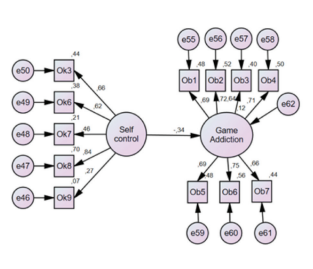The purpose of this study is to examine the relationships among self-control, problematic technology use, family harmony, self-esteem, and well-being. The sample is composed of high school students from several schools in Istanbul. The Turkish versions of the Brief Self-Control Scale, Digital Game Addiction Scale (DGAS-7), Smartphone Application-Based Addiction Scale (SABAS), Family Harmony Scale, Lifespan Self-Esteem Scale, and EPOCH Measure of Adolescent Well-Being have been used for collecting the data. IBM Statistical Package for the Social Sciences and Statistical Packages for the Analysis of Moment Structures have been used for the data analyses. Structural equation models have been created for both digital game addiction and smartphone addiction. According to the findings, self-control significantly predicts problematic technology use, and problematic technology use significantly predicts well-being through the mediation of family harmony and self-esteem. As the level of self-control increases, smartphone and digital game addictions decrease. However, as digital game and smartphone addictions increase, family harmony, self-esteem, and well-being decrease. The negative relationship between problematic technology use and well-being may be related to disruptions in family harmony and decreased self-esteem. The relationships among problematic technology use, gender, and academic achievement have also been examined. The research findings are discussed through the literature. Future recommendations based on the results have been presented for researchers and practitioners.
Cite this article as: Ekşi, F., Demirci, İ., & Tanyeri, H. (2020). Problematic technology use and well-being in adolescence: The personal and relational effects of technology. Addicta: The Turkish Journal on Addictions, 7(2), 107-121.

.png)


.png)
.png)
